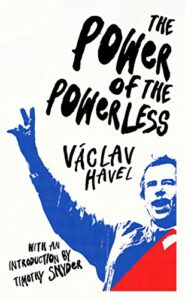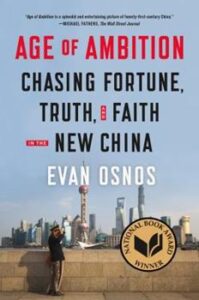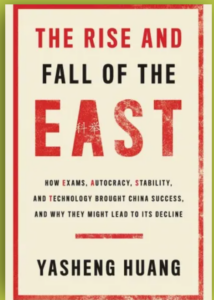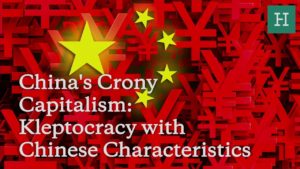The Mystery of the Disappearing Chinese Officials https://t.co/DrdqysZUWy
— Democracy Digest (@demdigest) October 26, 2023
How did Chinese writer Wang Xiaobo become a literary icon in a country famed for its constraint? His fiction and essays celebrated personal dignity over conformity, and embraced foreign ideas. It helped that he was adroit at crafting narratives just oblique enough to elude the censors. But the political context was also crucial, notes Evan Osnos, author of “Age of Ambition: Chasing Fortune, Truth, and Faith in the New China.”
After the crackdown at Tiananmen Square, in 1989, the Communist Party had risked falling into oblivion, behind its comrades in Moscow. It survived by offering the Chinese people a grand but pragmatic bargain: personal space in return for political loyalty, he writes for The New Yorker:
 The Party leader Deng Xiaoping broke with the orthodoxy of the Mao era; he called for “courageous experiments” to insure that China would not be like “a woman with bound feet.” Soon, new N.G.O.s were lobbying for the rights of women and ethnic minorities, and foreign investors were funding startups, including Alibaba and Tencent, that grew into some of the wealthiest companies on earth. …When I return to China these days, the feeling of ineluctable ascent has waned. …. This summer, I had a drink with an intellectual I’ve known for years. He recalled a time when he took inspiration from the dissidents of the Eastern Bloc: “Fifteen years ago, we were talking about Havel.” These days, he told me with a wince, “people don’t want to say anything.”
The Party leader Deng Xiaoping broke with the orthodoxy of the Mao era; he called for “courageous experiments” to insure that China would not be like “a woman with bound feet.” Soon, new N.G.O.s were lobbying for the rights of women and ethnic minorities, and foreign investors were funding startups, including Alibaba and Tencent, that grew into some of the wealthiest companies on earth. …When I return to China these days, the feeling of ineluctable ascent has waned. …. This summer, I had a drink with an intellectual I’ve known for years. He recalled a time when he took inspiration from the dissidents of the Eastern Bloc: “Fifteen years ago, we were talking about Havel.” These days, he told me with a wince, “people don’t want to say anything.”
The over-all effect is a revival of what the late Sinologist Simon Leys called the “lugubrious merry-go-round” of Communist ritual, and a culture of deliberate obfuscation that he likened to deciphering “inscriptions written in invisible ink on blank pages,” Osnos adds. The return of disappearances and thought work on this scale has made clear that, for all of China’s modernizations, Xi is no longer pantomiming the rule of law; he has returned China to the rule of man. At his core, a longtime observer told me, Xi is “Mao with money.”
Four major high-level Chinese officials have disappeared from the public eye within a three-month span. What’s going on? National Review’s Jim Geraghty asks:
 Earlier this week, my group of international journalists met with experts affiliated with Taiwan’s Prospect Foundation, a think tank focusing on cross-strait relations and international affairs that has close ties to the Taiwanese government.
Earlier this week, my group of international journalists met with experts affiliated with Taiwan’s Prospect Foundation, a think tank focusing on cross-strait relations and international affairs that has close ties to the Taiwanese government.
Kuo Yu-Jen, a professor at the Institute of China and Asia-Pacific Studies at National Sun Yat-sen University, told us, “Whatever happened with the defense minister, it has nothing to do with corruption. It has something to do with leak of intelligence, and the level of intelligence [that was leaked] is very high.”…Dr. Wen-hsuan Tsai, a research fellow at the Institute of Political Science in Taiwan, wrote that in one of the cases, the line between allegations of corruption and an intelligence leak may be blurry. RTWT
The opacity of China’s one-party authoritarian system creates huge speculation about why the officials left office and whether they will face legal censure, AP adds. “It’s possible to see the reshuffle either as a manifestation of (Xi’s) weakness or a sign of his strength. I lean toward the insecurity side of the explanation,” said June Teufel Dreyer, an expert on Chinese politics at the University of Miami.
Putin and Xi ‘soul mates’
 None of the targets [of recent party purges] showed any organized political intentions. The only visible pattern is that Xi and his loyalists appeared intent on snuffing out rival sources of authority, The New Yorker’s Osnos reports:
None of the targets [of recent party purges] showed any organized political intentions. The only visible pattern is that Xi and his loyalists appeared intent on snuffing out rival sources of authority, The New Yorker’s Osnos reports:
One after another, he got rid of anyone with power, an entrepreneur said: “If you have influence, you have power. If you have capital, you have power.” Xi is said to have spoken bitterly of watching Boris Yeltsin contend with Russian tycoons in the nineteen-nineties. Joerg Wuttke [president emeritus of the European Union Chamber of Commerce in China] told me, “When Putin entered the Kremlin in 2000, he assembled the oligarchs and said, basically, You can keep your money, but if you go into politics you’re done.” He went on, “In China, the big names should have learned from that meeting, because in this sense Putin and Xi Jinping are soul mates.”
Reformist leaders after the death of Mao Zedong, the founder of the People’s Republic of China, opened up the system enough to allow for innovation, entrepreneurialism, and economic growth, Columbia University’s Andrew Nathan* writes for Foreign Affairs. Now, however, Yasheng Huang’s The Rise and Fall of the EAST: How Exams, Autocracy, Stability, and Technology Brought China Success, and Why They Might Lead to Its Decline (above) predicts that the crackdown on freedom under the Chinese leader Xi Jinping’s modernized version of imperial rule may bring an end to the country’s brief spurt of dynamism.

Hudson
Many in the West had high expectations for Mr. Xi when he came to power in 2012. Over time, however, it became clear that Xiconomics was a hodgepodge of contradictions, notes Dr. Junhua Zhang, a senior associate at the European Institute for Asian Studies. President Xi is a typical authoritarian leader who does not put the well-being of his citizens first, he writes for GIS Reports:
For example, Chinese Communist Party (CCP) officials have repeatedly rejected the practice of “giving money to the population to stimulate consumption.” In fact, if the Chinese government would transfer 1 to 1.5 percent of GDP to households, China’s economy could grow significantly. Mr. Xi’s promotion of SOEs at the expense of the private sector reflects his rigorous adherence to antiquated Communist Party principles and is a violation of basic economic understandings.
The economist Xu Chenggang who fled China explained that his father, a prominent physicist and dissident, had spent decades under house arrest, but never lost faith in a comment from Albert Einstein, Osnos adds:
“The state is made for man, not man for the state. . . . I regard it as the chief duty of the state to protect the individual and give him the opportunity to develop into a creative personality.” Xu told me, “Historically, Chinese people didn’t know anything about constitutionalism or human rights. The proportion who do now is still small, but the number who are enlightened is not small. They know. That is going to be part of the future.” RTWT
*A former board member of the National Endowment for Democracy (NED).
“It’s possible to see the reshuffle either as a manifestation of (Xi’s) weakness or a sign of his strength. I lean toward the insecurity side of the explanation,” said #JuneTeufelDreyer, a Chinese politics expert at the University of Miami. #China #CCP https://t.co/w4MGnps65M
— Democracy Digest (@demdigest) October 26, 2023







